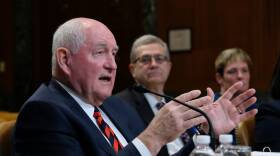EXPLORE MORE
BPR is on tape for the holidays! We'll be back live Monday Jan. 5th
Recent segments
-
Art Caplan: Baker's Right To Temporarily Ban Vape Products
The medical ethicist says vape products are deeply flawed and dangerous. -
Alex Beam: Funerals Are Better Than Weddings
The Boston Globe columnist joined Jim and Margery to dig himself out of that six-foot hole. -
In His New Book, Robert Kuttner Outlines What's At Stake In 2020
In January 2021, the person inhabiting the White House has to be a progressive, according to Kuttner. -
John King: Support For Impeachment In The House Is Growing
The recent scandal involving President Trump and the president of Ukraine has mobilized Democrats to launch an impeachment inquiry. -
Karen Spilka On Hands-Free Driving Bill: 'We Should Be Able To Do This'
The Massachusetts Senate president stopped by the Boston Public Library to discuss a range of statewide policy issues. -
USDA Relocation Is Part Of Trump's 'War On Science,' Says Corby Kummer
The move will force many researchers to give up their jobs, threatening their robust climate science research.
Listen to previous shows
-

BPR Full Show: After the Snow
Today on Boston Public Radio: We begin the show by opening phone lines, talking with listeners about youth mental health during the pandemic. John Della Volpe talks about Gen Z’s relationship to political activism, and the events that pushed them to action. Della Volpe is director of polling at Harvard Kennedy School’s Institute of Politics and a former Biden campaign adviser. His new book is: “Fight: How Gen Z Is Channeling Their Fear And Passion To Save America.” EJ Dionne discusses a surge in book ban efforts across the country. He also weighs in on the road ahead for President Joe Biden’s first nominee to the Supreme Court. Dionne is a senior fellow at The Brookings Institution. His latest book is “Code Red: How Progressives and Moderates Can Unite to Save Our Country.” Dan Adams updates us on the latest headlines from the local marijuana industry, including Gov. Charlie Baker’s filing of the Clardy Law, which would treat driving impairment from alcohol and marijuana the same way. Adams is a cannabis reporter and author of the “This Week in Weed” newsletter for the Boston Globe. Revs. Irene Monroe and Emmett G. Price III share their thoughts on the Pope’s statement on COVID-19 information, and the state of the Supreme Court. Rev. Monroe is a syndicated religion columnist and the Boston voice for Detour’s African American Heritage Trail. Rev. Price is founding pastor of Community of Love Christian Fellowship in Allston, the Inaugural Dean of Africana Studies at Berklee College of Music. Together they host the “All Rev’d Up” podcast at GBH. Richard Blanco shares some of his favorite winter-themed poems, including Wallace Stevens’ “The Snowman,” Jay Parini’s “Below Zero,” and Mark Strand’s “Lines for Winter.” Blanco joins us regularly to lead Village Voice, a conversation about how poetry can help us better understand our lives. He’s the fifth presidential inaugural poet in US history. His latest book, “How to Love a Country,” deals with various socio-political issues that shadow America. We end the show by asking listeners how they handled Saturday’s snow storm. -

BPR Full Show: Snowpocalypse
Today on Boston Public Radio: We begin the show by talking with listeners about the blizzard heading towards Massachusetts this weekend. Judge Nancy Gertner discussea Justice Stephen Breyer’s retirement announcement, and the current state of the Supreme Court. Judge Gertner is a retired U.S. District Judge for the U.S. District Court here in Massachusetts. She’s currently a Senior Lecturer on Law at Harvard University. Callie Crossley talka about the states fighting back against threats to voting rights, and the students at Wharton who believe that the average American worker makes over six-figures per year. Crossley hosts GBH’s Under the Radar and Basic Black. Anthony Everett shares the legacy of the WCVB television series “Chronicle,” which is celebrating its 40th anniversary. Everett is the Emmy Award-winning anchor of “Chronicle,” WCVB Channel 5's nightly news magazine. Its 40th Anniversary special airs tonight at 8 on WCVB. Sarah Harmon talks about organizing “Primal Scream” events around Greater Boston, and stress relief during the pandemic. Harmon is a mother, a therapist, a yoga and mindfulness teacher who runs multiple wellness groups, including Sarah Harmon Wellness, The School of MOM and The Postpartum Wellness Group. Sue O’Connell shares her thoughts on Michael Avenatti’s cross-examination of Stormy Daniels, and Sarah Palin's restaurant visit two days after testing positive for COVID. O’Connell is the co-publisher of Bay Windows and the South End News, as well as NECN's political commentator and explainer-in-chief. We wrap up the show by asking listeners how they’re handling pandemic stress. -

BPR Full Show: Gov. Baker, AG Healey, and more
Today on Boston Public Radio: Gov. Charlie Baker discusses current vaccination rates in Mass., and overpaid unemployment benefits in the state. He also takes listeners’ calls during “Ask the Governor.” Andrea Cabral shares her thoughts on the delay of Mayor Michelle Wu’s vaccine mandate for city workers, and a new gun law in San Jose that requires gun owners to have liability insurance and pay an annual fee. Cabral is the former Suffolk County sheriff and Massachusetts secretary of public safety. She’s currently the CEO of the cannabis company Ascend. Chuck Todd updates us on the latest political headlines, focusing on President Joe Biden’s potential picks for Justice Stephen Breyer’s replacement and rising tensions between Russia and Ukraine. Todd is the moderator of “Meet The Press” on NBC, host of “Meet The Press Daily” on MSNBC and the political director for NBC News. Attorney General Maura Healey discusses her decision to run for governor, and the dismissed charges in the Holyoke Soldiers’ Home case. We end the show by talking with listeners about Spotify’s refusal to remove Joe Rogan from their platform. -

BPR Full Show: Fiscal Finaglers
Today on Boston Public Radio: Art Caplan shares his thoughts on DJ Ferguson, a 31-year-old man who was denied a heart transplant at Brigham and Women’s after he refused to get vaccinated. He also talks about Neil Young urging Spotify to remove Joe Rogan from the platform – or face the removal of all of his music. Caplan is director of the Division of Medical Ethics at the New York University School of Medicine. We then ask listeners for their thoughts on refusing a heart transplant in order to remain unvaccinated. Juliette Kayyem discusses Justice Stephen Breyer’s retirement announcement, and concerns over potential cyber attacks from Russia. Kayyem is an analyst for CNN, former assistant secretary at the Department of Homeland Security and faculty chair of the homeland security program at Harvard University’s Kennedy School of Government. Ali Noorani weighs in on Gov. Ron DeSantis’ attempt to kick migrant children who arrived in the country without their parents out of Florida shelters and from transitional foster care by refusing shelter and foster care license renewal applications. Noorani is President and Chief Executive Officer of the National Immigration Forum. His latest book is "There Goes the Neighborhood: How Communities Overcome Prejudice and Meet the Challenge of American Immigration.” Shirley Leung talks about the Mass. officials trying to regain unemployment money they overpaid to people, and a “millionaire’s tax” that voters will consider on the ballot this November. Leung is a business columnist for the Boston Globe. Sy Montgomery updates us on the latest stories from the animal kingdom, from her recent resuscitation of Monet, the wild painted turtle, to the scientists who taught goldfish to operate vehicles. Montgomery is a journalist, naturalist and a BPR contributor. Her latest book is "The Hummingbirds’ Gift: Wonder, Beauty, and Renewal on Wings." We wrap up the show by asking listeners if they keep a secret stash of cash away from their partners. -

Corby Kummer: Restaurateurs moving to suburbia "not really completely new"
While many think the suburbs have a “boring, white bread reputation,” the pandemic has caused a wave of restaurateurs to set their eyes on suburbia over the big city. Food writer Corby Kummer joined Boston Public Radio on Monday to share why increasing numbers of restaurateurs are choosing to open restaurants in the suburbs rather than the big city – and how new of a trend this really is. Although the pandemic spurred many people to move from urban areas to suburbia, Kummer notes that independent, award-winning restaurants have long pre-dated the pandemic. “There's lots of different groups that are opening restaurants, and I think there's a more discerning customer base that wants higher quality,” Kummer noted. Kummer pointed to Il Capriccio Ristorante e Bar in Waltham, an award-winning Northern Italian restaurant that first opened in 1981. The original owner of IL Capriccio, Enzo Danesi, worked at Barsanti’s in Boston and Le Bocage in Cambridge before opening his restaurant in Waltham. Il Capriccio recently reopened at The Merc at Moody and Main. “This is part of a trend that has been accelerated by the pandemic and people moving to suburbs, but it's not really completely new,” Kummer said. Kummer is the executive director of the Food and Society policy program at the Aspen Institute, a senior editor at The Atlantic and a senior lecturer at the Tufts Friedman School of Nutrition Science and Policy.









